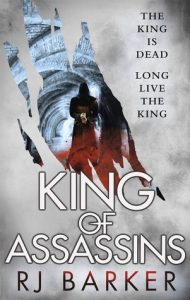King of Assassins by RJ Barker
 Caution: this review contains spoilers!
Caution: this review contains spoilers!
King of Assassins by RJ Barker is the final book in The Wounded Kingdom series and a thrilling tale of murder, betrayal, magic, broken friendships, sibling rivalry and so much more. It picks up roughly 15 years after Blood of Assassins and for a change we find Girton and Merela in quite a decent and happy place, hanging out together and growing old and playing with Rufra’s children. He has a favourite, a young girl he hopes may have what it takes to become his apprentice, and his king’s ideas are beginning to change the politics of the land. He has even become a bit of a celebrity, inspiring a new generation of assassins and providing a platform for some of the other, genuine practisers of the art to make their comeback. It’s a very pretty picture and a moment to enjoy because you know it cannot possibly last.
When the high king of Cedoc kicks the bucket Rufra sees himself as the obvious choice for his replacement so takes his family and friends to play a bit of the old game of thrones. He wants nothing more than to see the policies that have lifted the poor and outlawed slavery flourish across the land. He really is a good and honourable man, especially because when he wants someone dead he only intimates this to his assassin and leaves it to him, as opposed to directly ordering him. Yeah. It’s a fine line. In the wounded kingdom things are never as black and white as the Death’s Jester makeup Girton wears. The reality is things are a lot greyer as characters you’ve come to see as part of the ‘good guys’ teams are revealed to be less squeaky clean and more complex and nuanced than expected. The same goes for characters that were initially very easy to dislike who have now become trusted friends and close allies of Rufra, in particular Aydor who I remember being an insufferable shit in Age of Assassins.
This third and final book is the best volume of the series, which in my opinion is something very difficult to achieve, especially taking into account the spread of time between the three books. It is a journey over decades and it is wonderful. Barker has to reinvent the characters each time, showing development and change whilst also holding onto the elements and the pieces of familiarity that made the reader fall in love with them in the first place. Plus it’s so rare to find oneself with an instant inclination to start at the very beginning of a series so quickly after wrapping it up, but I cannot help but think this is the best way to get the true story behind The Wounded Kingdom. The one that is constantly at play in the background but never intrudes until the very last moments, the one that shows us the mirror image of everything we thought we knew and flips it upside down. This is the reason I was in complete awe at the end of King of Assassins. The amount of threads that came together, that displayed their true colours for the first time, that revealed how interwoven they were from the very first book is utterly stunning.
King of Assassins is a masterful finale, thoroughly entertaining and constantly impressive. It is beautifully written and sports a reveal that makes Keyser Söze look like a rank amateur and had me itching to go back to the start and discover everything I missed the first time round. I cannot recommend this series highly enough.
